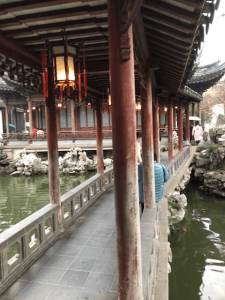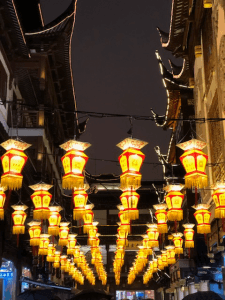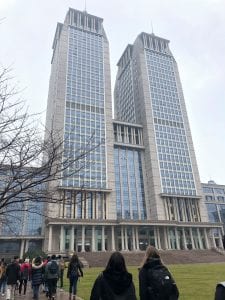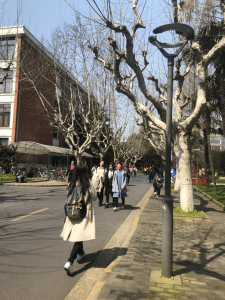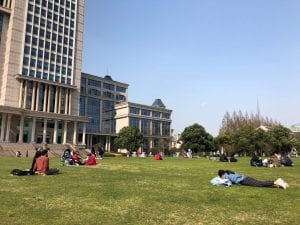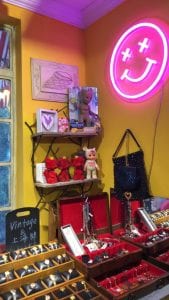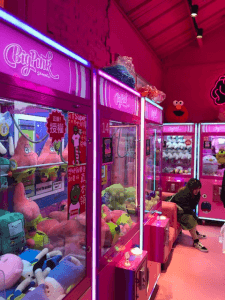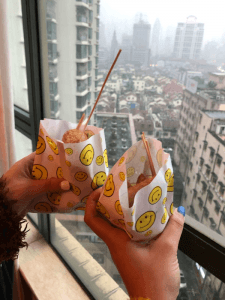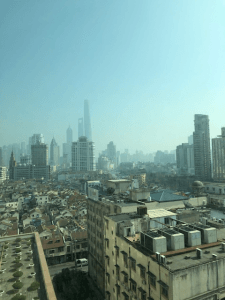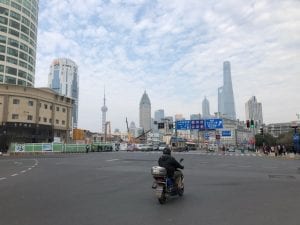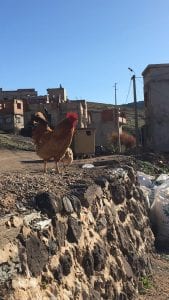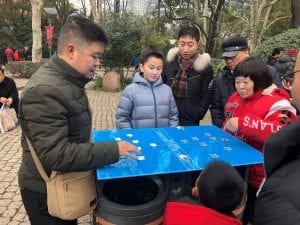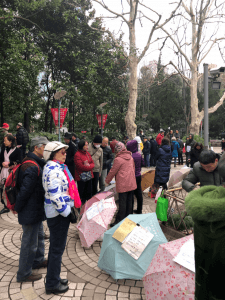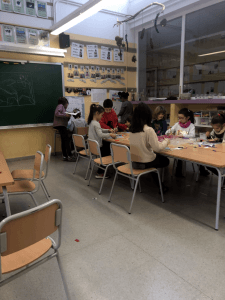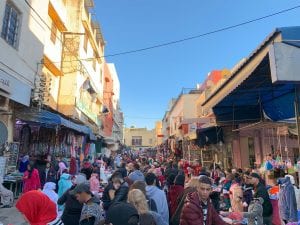I Am More Than My Resume: Finding Friends and Myself Across Europe
People always think it’s funny when I bring it up, but I cannot stress enough how different of a person I am now than I was during high school. Like, complete 180º different. Going away to college didn’t just give me a chance to meet people outside of the small town I grew up in, but it also affirmed and challenged different parts of my identity that I didn’t even know were possible. It’s been a long process of coming into myself (and it’s not done), but I have been more in tune with my communities and identities in a way that I had never had before college, and in a way that set me up for an abroad experience.
Many people say that going abroad is a chance to “find yourself.” And, in many ways, I believe that this is true. Spending time in a community that is outside of what you are used to makes you think more critically about how you walk through the world. But there’s also the importance of the period before going abroad that is very important in accessing your identity. Doing a self-inventory before I went abroad was a very important part of putting me in the right mindset to travel and live in such a different space. The communities and bonds that I left behind in DC for the semester have been very important in understanding how important a support network is for me. There is a necessary labor that happens in building a space for yourself, and it is so important to have that space in order to be safely challenged and continuously grow, knowing that you have people around to catch you if you need it.
One of the biggest culture shocks for me since going abroad has been the intense paradigm shift in identifying with the work that you do. In the US, it is a given that your identity is constructed by what you spend the majority of your time doing (perhaps work or school). It’s not uncommon to meet someone for the first time and be asked the age-old question: “So what do you do?” It has been so ingrained in my mind that I began to also identify with whatever job I was doing, or even what courses I was taking. In Europe, the idea of identifying yourself first as your career or job is so foreign, that often it doesn’t even come up in conversation until much later in knowing a new person. Actually, I couldn’t even tell you the jobs of most of the people the people that I’ve met so far in my travel experience. It just simply isn’t as important. And the reason I bring this up, is because it has made me consider my identities even more (ironically). People don’t ask me what job I’m working or what internships I’ve had, but they do ask about my family, my hobbies, and my passions. In this way, I’ve been able to actually take more ownership of my identities because of how much more they mean in this cultural context. People ask because they want to know, and I’ve become prouder to share these parts of myself that previously might have been secondary to whether or not I’m working a “hillternship.”
I’ve seen some beautiful places and met some amazing people, and each part of this experience has been a way to both affirm and safely challenge how I walk through a space. That is not to say that you *need* to study abroad to get out of your comfort zone, but sometimes you need to peek over the other side of the fence to see something new in the world and in yourself. Expanding your mindset, and also your community, gives you a space to become more of yourself than you ever thought possible, and in the best cases, gives you people to always fall back on no matter the circumstances.
A (sort of) American Abroad
I didn’t realize how distinctly American I was until I began my study abroad experience in China. I knew I was an outsider when I was walking through YuYuan Garden and was met with deadlock stares. I was aware that going crazy in arcades garnered the stares of people who did not realize that the avid arcade culture is something that is unique to China. However, this became especially apparent when I began my classes at Fudan University. There is something unique about the way that American students perceive their presence within a classroom that can be categorized under the characteristics that seems to define all Americans abroad: loud and obnoxious.
YuYuan garden during the day (left), when entry costs around five dollars a person. The same garden area during the annual lantern festival, this year in celebration of the Year of the Pig. Pig decor and memorabilia are especially common in Shanghai this year!
On my first day of class my friends and I arrived at Fudan University fifty minutes before class began, purely driven by first day nerves. What could barely be defined as a crowd of American students, three or four at best, had now become the sole source of noise in the hallway outside the classroom. We complained about the commute, passionately expressed our interest in acquiring breakfast, and constantly messed with the touch screen tablet that is stationed outside every classroom. Putting it not so delicately, we were being loud and obnoxious. Enter another foreign exchange student, headphones in, eyes averted to the ground, clearly not in the mood to talk. Naturally, we asked her what her name was and where she was from. When she responded that she was from the Netherlands and returned the question, four scattered and equally jarring voices responded “America!” She then did what most people do when they see a crowd of loud and obnoxious foreigners: she smirked, nodded mockingly, and said, “yeah I figured.”
Fudan University in Shanghai. This is one of Fudan’s two campuses, were most of my classes take place. Students enjoy many locations to relax within the traditional campus setting.
That was an interesting experience for me, to say the least. I had never identified myself as an American. According to my passport, I am not. However, there is a level solidarity that I now feel with my classmates. Regardless of our own cultural backgrounds, we had all been somehow influenced by our time in America; it effected our behavior, our mindsets, and the way we viewed our responsibilities as students. American students are more rambunctious, both in their behavior and their academic ideas.
(From left to right) A Chinese vintage store in Tianzifang, Shanghai. One of the many gigantic arcades located around the city, this one was also in Tianzifang. “Fried Ice-Cream” from a small fried foods stall across the street from our apartments. These turned out to be fried deep purple balls of custard and not ice-cream at all. They were still absolutely delicious!
This became clear to me in my business class. When asked to pitch a technological innovation that would improve student life, there was a clear division of groups: Americans and other foreign exchange students. The American students went wild, we pitched a cafeteria app that would eliminate language barriers, account for dietary restrictions, and even tell students how busy the cafeteria was before they got there. Ambitious, as expected, but also, as our teacher explained to us, very difficult to implement and coordinate. The other group came up with a feasible library cataloguing database for which the technology was readily available. The teacher loved it.
This made me question whether or not this blind ambition was beneficial to us as students. Perhaps it would be better to stick to safer options. I have come to the conclusion that neither option is superior, they are just starkly different. They are reflections of the diversity of human thought, traditions, and culture. My academic experience has been opening me up to facets of educational practice, student culture, and social etiquette that differ drastically from what I am used to. I am very excited to dive into this new type of student life and gain different perspectives on what I had previously understood as the accepted order of things.
Two incredible views of Shanghai. The first is from my apartment (left) and the second if from the YuYuan Garden metro stop (left) which is the starting point of our forty-five minute commute to Fudan University.
Safety First
Shalom everyone! I'm back with another blog entry, however the topic is a lot more serious. Last night was the first night that I truly felt unsafe abroad.
Israel is a very modern country that contains some of the world's most advanced technological systems in the world--particularly in the defense sector. Because of this, Israel seems like a very Westernized country, and most of the time it feels like I am in Europe. However, last night reminded me that is not the case.
Last night, Thursday, March 14, I was eating dinner with my friends at a market similar to that of Union Market in D.C. We heard a loud crash but did not think anything of it because there was a lot of construction going on around the area. However, immediately after, we heard the red alert sirens all across Tel Aviv. The red alert sirens warn Israelis to get to the nearest bunker/safe space because of rockets and missiles being fired into Israel. The security guards at the market immediately ushered us into the market for safety precautions. Thankfully, no one was harmed by these rockets shot from Gaza because they were immediately shot down by the Israeli army.
This experience made me realize exactly where I was in the world. It is very rare for there to be rockets fired towards Tel Aviv, so it put many things into perspective:
1. I am extremely grateful to be alive, healthy, and safe.
2. Download a local news app to get notified of important day-to-day activities going on in your host country.
3. If you are in a similar situation, wait until it dissipates and you have all of the facts before calling any loved ones. Calling your parents on the phone while you are in a panicked state will do more harm than good.
4. Always travel with at least 1 friend in case you ever feel like you are in danger.
5. Keep all important phone numbers for your host country/school in one, organized place! You should NOT wait to do this after something dangerous happens (ex. over 75 students in 20 minutes joined the TAU Emergency WhatsApp group AFTER the rocket incident).
Like I said earlier, I am so grateful to be alive and safe, and I am so thankful to be in a country that prioritizes safety and security over everything! This experience did not make me afraid of this country, in fact, it made me more appreciative of it! I'll talk to you all next time! Shabbat shalom!
La Vida en Barcelona
I am about halfway through my time to study abroad in Barcelona, and I have no idea where the time has gone. I have continued volunteering at the local elementary school called Dolors Almeda and I feel like interacting with the students there has continued to teach me a lot and make Barcelona feel even more like home. For me personally, volunteering has had its moments when it was a little harder due to the current political climate in Barcelona. With the big trial going on and Catalunya wanting its independence from Spain, there have many protests and demonstrations throughout the city. This causes a great impact on the metro and other means of public transportation, which makes it harder to get around. Also the fact that you never want to get caught up in the protest, so just being extra aware of where you are at all times has become increasingly important. Either way, volunteering has given me a chance to really get to know some of these students, and I think it has helped a lot in terms of their perspective of the United States and what it means to be American. With the students being so young, a lot of them have very big and grand ideas on what the United States is and it is so funny to hear the things that they associate the United States with the most. I feel like I've been able to give them more and more information on a place that a lot of them hope to go and visit one day, so I really hope that it lives up to what they are expecting. I also think that volunteering with these students has changed the way that some of their parents look at and see Americans. I feel like there are a lot of stereotypes surrounding Americans and this idea that we come here just to enjoy the beauty of their home without really getting to know it and contribute to it, and I feel like me coming in and helping teach their children and me trying to learn and understand their language and culture has truly gone a long way. I am very sad to see time going so quickly because I absolutely love it here, but I am very excited to see what these next two months have in store.
High up in the Atlas Mountains, My Weekend with the Moroccan Amazighs
We travelled four hours by van to the point where the asphalt became dirt, and the dirt became rocks. The van had been rocked side to side, like a boat fighting a storm, teasing a capsize. Lilah was huddled away in the back of the van, stomaching her throw up. Four hours in a van with closed windows and interminable traditional Moroccan music (you know, the heavy drums, flutes, and whistles) made us all a little sea sick.
“It will be worth it in the end,” we were promised.
And it was. L’Hamdulillah.
We were heading into the Atlas Mountains in the east of Morocco. A place on the outskirts of Ifrane National Park, where the typically hot and flat Moroccan terrain became hoards of Atlas cedars casting cold shadows in the already freezing climate. I wanted a jacket. Lilah wanted to puke.
In the heights of the Atlas Mountains was a village called Ben Smim. Our weekend excursion was a cultural immersion experience through a homestay with an Amazigh family in a true Amazigh village. The Amazigh population, also known as Berbers, are the indigenous ethnic group to Morocco, predating the Arab population that came to Morocco centuries later. They are often left out of the political system in Morocco, forgotten in the Moroccan mountains, where they reside in rural villages and towns with poor infrastructure, and less job opportunities. But that doesn’t make them unhappy. If the lack of economic benefits made them unhappy then they wouldn’t have greeted the incoming students with a traditional Amazigh concert and dance party! We were swarmed by children and hugged by mothers. We couldn’t speak their language, and they couldn’t speak ours, but never before has language been so unimportant. It’s amazing how quickly humans can bond through the words “Eat,” and “A lot.”
My roommate, Noah, and I fell asleep on our couches to the howls of dogs, and we awoke early in the morning to the cries of roosters. Animals were key to every household in Ben Smim. Almost every family owned a couple chickens, a cow, and maybe a cat or dog. Most of the food prepared came from the animals that the family had owned or from whatever the neighbors were willing to sell. And even though the economic conditions were weathered, each morning and each night Noah and I were presented with plates of the most delicious, farm-to-table meals.
It was a no-brainer when we were asked if we wanted to give back to the community. When they would provide for us, the Amazighs of Ben Smim asked for nothing in return. So when we began planting a garden in their one elementary school, we were thanked graciously. A number of us took it into our own hands to organize a soccer game with all the local children. I was shocked when an audience came about to watch the Moroccans face off against the Americans. It was a fun day filled with giving back to the Amazigh people.
However, the acts of service I wanted to do involved truly giving back to the community. I wanted to repair houses, pave the roads, and fix street lamps. It took a hearty dinner of laughs and bad Arabic for me to realize that the Amazigh people of Ben Smim didn’t need our help. They were happy just to host us. In the future, a true act of service that I know I will commit to would be to spread the history, culture, and problems of the Amazigh people. I want to share the stories of my host mom her husband and their two children. I plan on lending my voice to theirs, making their voice louder, to hopefully make them heard in Moroccan politics, and around the world. This blog post isn’t a bad start: https://www.aljazeera.com/indepth/features/2014/03/moroccos-berbers-urge-broader-reforms-2014357321228806.html
An Ancient Sense of Community
The first thing you notice when you touch down in Shanghai is the complete lack of personal space. I say this as someone who is usually comfortable cramming into a packed subway car in Manhattan. We were warned of this cultural difference before we left for the semester, but there is nothing quite like experiencing it for yourself. What I’ve come to realize, however, in the last few days that I have been in China, is that this cultural difference is actually one that forces you headfirst into the local community. The people in Shanghai live in a level of comfort with each other that I have never experienced in any of my travels. There is unique a sense of camaraderie and tradition that the entire community adheres to. The ancient cultures and practices that are the foundations of Chinese life are clearly ingrained in every individual I have come across in my short time in Shanghai.
On our scavenger hunt we came across an adorable woman leading a board game in People’s Park and we were all enamored by her charisma. Although we didn’t understand the game, we were positive she was winning.
An amazing example of this sense of community is the Shanghai marriage market in People’s Park. We experienced this practice firsthand on one of our initial activities as a cohort. The Shanghai marriage market is a tradition that has been going on for generations. Essentially, parents gather around in the “blind corner” of the central People’s Park, and hold a sort of showcasing for their unwed sons and daughters. On opened umbrellas, advertisements can be seen boasting good looks and successful careers, as the actual bachelors and bachelorettes are nowhere to be seen. This practice is a clear indicator of the tradition and culture surrounding marriage in China. Parents see it as their duty and right to make sure that their children find the perfect match. This is a very traditional practice that makes me thing of the way marriage is viewed in India as well. I find it so interesting that ancient cultures can bring their value systems into the 21st century unbothered by the global culture of the modern era and pass these traditions down to their children. This is very clear in Chinese culture and I look forward to discovering more of Shanghai’s hidden cultural gems in the months to come!
The Shanghai Marriage market was such an interesting event to walk through. Parents swarmed us to find out if we wanted to marry their children and even pulled out pictures to show us and convince us to say yes. It was definitely a memorable sight.
Gracias!
L’Hamdulillah! The Beginning of my Community Service Journey in Rabat
Labas? Labas L'Hamdulillah!
How are you? Good, Praise be to God!
It was an exchange I made with almost every Moroccan on the street. Whether it was my host dad, my professors, or my hanout guy, it wasn't uncommon to say L'Hamdulillah after almost every greeting. At first I felt like I was appropriating a culture, a culture that I was new to. I was a foreigner still, with a target on my back for all the merchants and vendors to try and scam me out of a few Dirham. But I was assured by almost everyone in Morocco that speaking Diriga (their country's dialect of Arabic) was necessary if I truly desired complete immersion and inclusivity. Everyone says l'Hamdulillah proudly because it ties together a love for country, Islam, and family. After I sneeze. l'Hamdulillah! The food was amazing. l'Hamdulillah. Barça beat Real. l'Hamdulillah!
l'Hamdullilah! l'Hamdulillah! l'Hamdulillah! I loved the phrase. Taxi drivers would chuckle to themselves and politely say it back. My hanout guy would spread his arms out wide and shout it to the skies whenever he saw me. Two Dirhams for a Snickers. "Everything in Morocco is so cheap," I would say, "l'Hamdulillah!" Everyone praised God because there was so much to be thankful for. Healthy families, good weather, and cheap foods. As a student from the States, Morocco seemed too good to be true. My first week in the country was otherworldly, l'Hamdulillah! Only, it took the novelty to wear off for me to realize that not everything was good food and colorful markets. My daily walk to the IES Center took me through the markets of the old Medina. Day in and day out I would make the thirty minute walk, breathing in salted cod and drying clay. The sights of the colored scarves in storefronts dancing in the wind, and the banners of makeshift umbrellas reflecting vibrant colors over the sandy paths made for a distracting spectacle. So distracting that I never noticed those in the shadows, tucked away behind the crowds of people hoping for a few Dirhams to be tossed their way. If everything was so cheap then why were people so hungry. If you maneuvered yourself through the hagglers, and sidestepped the future football stars of Morocco, then you would see that the beggars and the homeless were disabled, handicapped, and ill.
In my IES program I am a member of the after school Service Club. Our first meeting is next week, and we are supposed to bring in ideas on how to improve the community in Rabat. My experience so far in Morocco has shown me that there is much deeper socioeconomic issues that are facing the country. I hope to pitch my idea to help the handicapped, disabled and homeless on the streets of Rabat to my service club and hopefully rehabilitate those in poverty.
One day, on my daily walk home from school I passed by a paraplegic man, begging on the ground. Unsure of how he would react knowing that I was a foreigner, I slipped him a ten Dirham coin. "l'Hamdulillah," he smiled.
Ahlan!
This cold, sunny day marks the end of my third week in Amman. Each day has brought new adventures, amazing views, new friends, and delicious food. From the moment I arrived, Amman has kept me busy with its beauty and incredible people. I have seen Jordan’s well-known hospitality in every corner, beginning with my first day in Amman as my host mom welcomed me home with a big hug and a warm meal. I live with a small family and have a new little sister. We’ve become close really fast and have little dance parties every day when she comes back from school. My mom’s cooking outshines any other and her mom instincts are to feed me three times as much as I usually eat. My family has definitely been one of the highlights of my time here thus far.
Traveling has been another highlight from this trip and Jordan offers countless places to explore. My favorite has been Jerash, a small city just North of Amman. Along with a great group of friends, I explored the Greco-Roman settlement of Gerasa and admired the arches and columns of the Temple of Artemis. After enjoying the city’s history, we headed further up into the mountains and stayed in a small villa. Here, I witnessed the most beautiful sunset and views of the city. This charming place allowed me to take a peek at Jordan’s rural, peaceful way of life.
Classes have already begun and I have enrolled in thought-provoking courses as well as extensive Arabic learning classes. The professors are all extremely qualified and passionate about their work, which creates an even more intriguing learning environment. My favorite class, thus far, is Islam in the Modern Context, where my professor has created an open-discussion learning setting and encourages us to open our minds to controversial topics. CIEE has truly impressed me with its selection of great courses and professors.
While my experience here has been mostly positive, there have been some challenges. The language barrier has definitely been something to get used to. However, even though I have only been here for a little bit, I can already feel my Arabic skills improving and feel more confident in my speaking. Another challenge has been getting around the city and knowing where I am. The first week, I got lost every time I took a taxi and that created lots of anxiety. However, I have overcome this and can now direct my driver without a problem. While it was complicated at first, I can already say that I feel at home here in Amman.
For my next blog, I hope to share more of my travels around Jordan and other countries in the Middle East. I also hope to begin my research and learning on immigration and identity in Jordan.
Min shufak!
New Identity in a New Language
By Dom Reynoso
Over the past few years since moving away to college, I have been on a journey of discovering how my different identities and parts of myself interact with each other. I typically identify myself as a Latinx gay man, which are two identities that have combined and contradicted each other throughout my entire life. It has led to a lot of confusion growing up, and it has been an experience of slipping through the cracks. I’m not always seen as “Latinx enough” to operate in those spaces, and at times not “queer enough” to operate in queer spaces because of my race. I think it comes from the reality of how our communities are represented and marketed to the world. When I’m at home in the US, it’s often a struggle to express my identities to people in a way that doesn’t detach them from myself. People typically want an explanation that is coherent with their perception of the world; they want an explanation of “Latinx” that sounds like what they’ve seen in the movies, or a definition of “queer” that can be explained to them without their discomfort. As you can imagine, it makes it difficult to parcel myself out in this way and explain my identities so that they feel lived-in instead of hollow.
Pride in identity is something that I have been challenged with since coming to college. Before that, I had never understood that I could express pride in something that wasn’t normative. And, when I grew to love and express my identities in college, I think it sometimes confused some people. It evoked a sense of disruption when I talked about the intersections of my identities around people who didn’t expect me to. But slowly over time, I got more and more comfortable with the fact that I can claim my identities without shame or fear. Going abroad is such an interesting experience because, in many ways, it is like starting all over learning how to express yourself. What seemed so easy before now exists within the context of an entirely different culture and language. In Italy, people claim their identities in a very different way that continues to change my perception of identity. For many Italians I’ve met, they have a much stronger sense of regional identity than we might find in the US. People classify themselves by their hometown/region first, and then perhaps by being Italian, and in extremely rare cases, as European. It creates a very different aspect of identity than I’m typically used to, but it has a historical reasoning. For many Italians, they remain in the regions that they’re from, and different parts of Italy even speak different dialects (that, according to my host mom, she herself can’t even fully understand when she travels to different regions). This kind of construction of identity is vastly different than what I’m used to, but it is refreshing in the sense that people here are just used to claiming their regional identities more frequently and with more enthusiasm.
It is interesting how a culture and language shift changes your perception of how to think about yourself and the different parts of you that you show to the world. It’s been about a month since I’ve arrived in the country, and I’m surprised everyday about the different things I pick up on. There’s still a lot to be discovered here, and little by learning I’m learning how to define myself again (and maybe this time in Italian).


